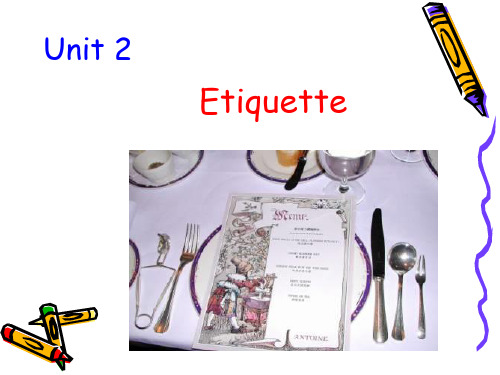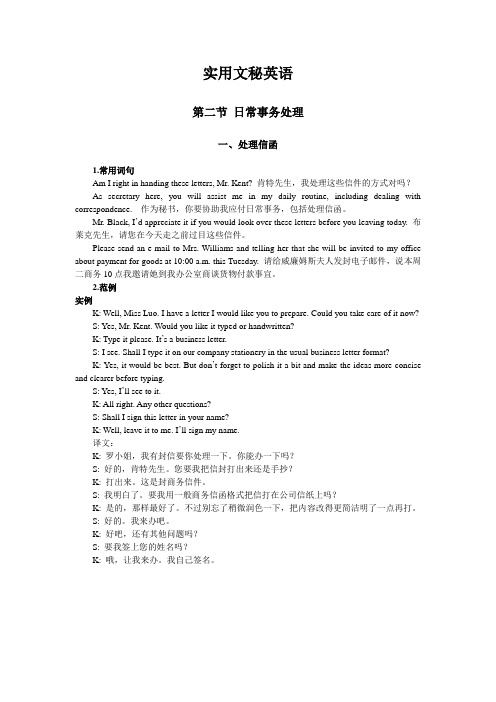文秘英语unit2
文秘英语 unit 2

• Never turn a wine glass upside down to decline wine. It is more polite to let the wine be poured and not draw attention. Otherwise, hold your hand over the wine glass to signal that you don't want any wine. • • If food falls off your plate, pick it up with a piece of silverware and place it on the edge of your plate. Never spit a piece of bad food into your napkin. Remove it from your mouth with the silverware you put it in with. Place it on the edge of your plate and cover it with another piece of food if you can.
4. The Table Setting
Knives and forks
Dinner Fork
Soup Spoon Dessert Spoon Butter Knife
Salad Fork Dinner Knife
Using the knives, forks and spoons
• When you hold the knife or fork, you should relax your fingers.
Unit 2
Etiquette
文秘专业英语unit2

文秘专业英语unit2篇一:文秘专业英语1-12单元社交礼仪中文译文文秘专业英语1-12单元社交礼仪中文译文Unit 1Part Five: Social Etiquette面试该如何着装面试时给未来雇主留下的第一印象非常重要。
面试官对你的判断首先取决于你的外表和着装。
这就是你为什么要职业化着装的原因,即使将来的工作环境是很随意的。
也许你想知道什么样的第一印象不仅算得上好,而且是棒极了。
求职者如果着西装、系领带会比穿着破旧的牛仔裤和T恤衫给别人留下的印象好得多。
男人的面试装西服(单色- 海军蓝或者深灰色)长袖衬衣(白色或者与西服配套的颜色)皮带领带深色短袜,保守、稳重风格的皮鞋少许或者没有首饰整齐,职业化的发饰少用刮胡水修剪整齐的指甲文件夹或公文包女士的面试装西服(海军蓝,黑色或深灰色)西装套裙有足够长度,确保你能很舒适地就坐配套的女士长袖衬衫式样稳重的鞋子少量的首饰(不配戴叮当作响的耳环或满手腕的手镯)职业化的发型中色的袜裤淡妆和淡淡的香水干净、整齐修剪的指甲文件夹或者公文包Unit 2Part Five: Social Etiquette了解办公室礼仪和行为举止1. 控制说话音量。
特别留意你说话是否大声。
无论是当面谈话还是打电话都应想到关上办公室门并且降低音量。
2. 将私人电话和邮件降低到最低限度。
时刻记住有其他人在周围并且这是公共场所。
不要将公司电话、传真、邮件用于不恰当的事情或是私事。
、3. 避免在别人宁可自己处理事情时迫不及待地试图提供你的帮助。
a) 与别人分享一些专业方面的信息这很好,但是说闲话就不对了。
仅与合适的对象、上司和管理阶层的人直言不讳地讨论一些私人问题。
b)注意你周围散发的气味。
在社交场合少喷科隆香水。
c) 避免食用味道很重的食品和香料,它的味道能在整个办公室散发。
7. 让你的个人工作空间始终保持整洁、干净。
一般说来,东西少点会更好。
8.使用公共空间时要注意客气和礼貌,比如说休息室或者厨房。
秘书英语:Unit2

秘书英语:Unit2Unit 2 How Does a Secretary Work in the Office?本单元教学要求:1.掌握秘书工作职责、写商务信函的基本知识2.了解如何处理好与上司和同事之间的工作关系3.熟悉商务礼仪Section 1 Meeting the Office Staff一、背景知识打招呼在建立人际关系中起着润滑剂的作用,特别是在和上司、同事还不熟悉的时候。
中国人见面时,习惯说“吃了吗?”“去哪儿?”等关于个人生活的话来打招呼。
这在英国或美国人看来,不是想请他们吃饭就是打听他们的隐私,很不习惯。
因此,在国际交往中,要“入境随俗”。
每天一进工作单位,可以适时和遇到的每一位同事说:“Good morning/afternoon”。
说话时,要注视对方,保持微笑,还要区别使用正式用语和非正式用语。
如对上级和初次见面的人,要称呼:Mr/Mrs/Ms/Miss +姓,如Mr/Mrs/Ms/Miss Smith/Green/Handerson ,或Sir/Madam。
对有头衔的人,用头衔+姓表示尊敬,如Dr Brown, Professor Black。
对熟悉的人、同事、同辈人,可直呼其名(这点也同样适用于介绍),如Bill, Ann等。
介绍是一个人对另一个人的正式引见,可以分为自我介绍和第三方介绍。
第三方介绍顾名思义是由第三方介绍另外两方相识。
介绍时通常要掌握以下原则:1.把男士介绍给女士(但在工作和商务场合,不分性别,要按照级别介绍:把级别低的介绍给级别高的);2.把年轻的介绍给年长的;3.把次重要的介绍给重要的;4.把主人介绍给客人;5.把家人介绍给来宾;6.把未婚的介绍给已婚的。
二、课前提问:1. What preparations should you make for meeting the office staff?2. How do you greet different people?3. What office etiquette do you know? Name three.4. What is the right attitude to office work?5. What skills do you need for administrative work?6. Whom should you turn to for help when you have some problems?三、语言学习How are you? 你好。
秘书英语 Unit 2

日常公务礼仪
名片使用礼仪
初次见面时,一般都要赠送一张名片。
交换名片时,要双手拿住名片两角,以文 字正向对对方。
双手接名片,看几秒种,并把对方的名片 放在桌上,不能在名片上压东西。 用餐时不要出示名片,应等到用餐结束。
日常公务礼仪
拜访礼仪
(1)预约好时间、地点 (2)做好有关的准备工作 (3)准时赴约 (4)及时告辞 (5)不要议论对方
professionalism [不可数名词] the expertness characteristic地位
How to get along with your boss
1 Show respect. Your boss is responsible for your work and the work of your colleagues. That can be a significant burden. Try to understand the business from your boss's perspective. 尊重上司, 站在他的角度去理解问题。 2 Don't be afraid of your boss. Some supervisors can be intimidating, but remember, your boss needs you. Your performance is often key to the success of your boss. 不要惧怕你的领导。即使他 很强势,他还是希望你为他分忧。
Respect the cultural differences
American staff prefer communicating by E-mail while the Chinese staff like face-to –face communication; seniors pay more attention than junior ones to the relationship between the communicators rather than the recognition of the problem itself; male staff want to control the situation of the communication more than female staff.
秘书英语unit 2

Warm-up
A. Look at the pictures and match them with the words or phrases in the box.1.2.3.4.5.6. A. Folder B. Xerox machine C. fax machine D. scanner E. laptop F. filing cabinet B. According to the above-mentioned words or phrases, answer the following questions. 1. What should we do if we want to have more copies of a document? 2. Which of these equipments have you used before? 3. What do you think is the biggest advantage of a laptop?
Listening &Speaking 1
A. Extensive Listening Wang Lin is speaking with the HR Manager the first day she goes to work. Listen to the Listening & Speaking 1 and answer the following questions. 1. Where does the conversation take place? 2. What is the relationship among the three people in the conversation? 3. Why does Wang Lin need others’ help and guidance?
文秘英语 unit 2 Office Equipment

Part 3 Text B:
• Text B: Getting to Know Electronic Equipment • New Words • Phrases and Expressions • Notes • Exercises
Notes:
[1] The modern office is sometimes referred to as the “electronic office” because of the electronic circuitry within so much of its equipment, including telephone, dictating machine, fax machine, computer, copy machine, printer and paper shredder which are the tools and weapons people use to do the work of our advanced society.
Unit 2
Office Equipment
Contents:
• Part 1 Dialogues • Part 2 Text A The Evolution of Office • Part 3 Text B Getting to Know Electronic Equipment • Part 4 Extended Reading • 参考译文:Text A 办公室的演变 Text B 认识电子设备
Notes:
本句中,as evidenced by the blackout of August 2003结构中as后省略了was,整 个部分相当于非限制性定语从句,其中 as指代前面most offices would be unable to function without computers这一事实。 这种由as引导的非限制性定语从句可置 于句首。请看下例:As is well known, smoking is harmful to one’s health. 众所 周知,吸烟有害健康。
(完整word版)实用文秘英语-日常事务处理

实用文秘英语第二节日常事务处理一、处理信函1.常用词句Am I right in handing these letters, Mr. Kent? 肯特先生,我处理这些信件的方式对吗?As secretary here, you will assist me in my daily routine, including dealing with correspondence. 作为秘书,你要协助我应付日常事务,包括处理信函。
Mr. Black, I’d appreciate it if you would look over these letters before you leaving today. 布莱克先生,请您在今天走之前过目这些信件。
Please send an e-mail to Mrs. Williams and telling her that she will be invited to my office about payment for goods at 10:00 a.m. this Tuesday. 请给威廉姆斯夫人发封电子邮件,说本周二商务10点我邀请她到我办公室商谈货物付款事宜。
2.范例实例K: Well, Miss Luo. I have a letter I would like you to prepare. Could you take care of it now?S: Yes, Mr. Kent. Would you like it typed or handwritten?K: Type it please. It’s a business letter.S: I see. Shall I type it on our company stationery in the usual business letter format?K: Yes, it would be best. But don’t forget to polish it a bit and make the ideas more concise and clearer before typing.S: Yes, I’ll see to it.K: All right. Any other questions?S: Shall I sign this letter in your name?K: Well, leave it to me. I’ll sign my name.译文:K: 罗小姐,我有封信要你处理一下。
文秘英语unit 2

Unit 2Observing Proper Office EtiquetteI. Teaching Objectives:To help students learn proper office etiquette, and will know correspond English expressions about proper office etiquette.To introduce to the students how to receive visitors.To help students learn how to write an invitation letter.To help students learn appropriate English expressions to receive phone calls. II. Teaching focus and difficultiesTeaching focus: to teach students corresponding English terms about proper office etiquette, some related English expressions to receive visitors, and the writing of English invitation letter.Teaching difficulties: the format of invitation letter, and appropriate expression of making phone calls.III. Teaching methods and AidsThe lesson is carried out based on interactive teaching mode, aided by multi-media teaching, including pictures, video clip, and PowerPoint.IV. Teaching time: 6 periodsTwo periods for Reading A; Two periods for exercises of Reading A and Reading B; Two periods for simulated writing and writing and speaking.V. Teaching ProceduresReading A1. Lead-inWatch the video clip and then think about questions:What is etiquette?Is etiquette important in the office?What do you think are the good manners and bad manners in the office?2. Comprehending the text2.1. Go through the whole text.4 Main parts related to the proper office etiquette:AttitudeEthicsPersonal habitsAppearance2.2. Focus studyPara.1⑴Either way, it is at best embarrassing and at worst difficult or impossible to gain confidence, respect, and cooperation of others when widely accepted practices are cast aside.at best充其量;至多at worst在最坏的情况下embarrass使窘迫;使尴尬;使为难i.e.: 她的粗鲁行为可能会让你尴尬She may embarrass you with her rude behavior.Her rude behavior may embarrass you.cast aside 抛弃;排除;废除Part 1: Attitude(1) People are uncomfortable around someone (who views the world darkly). More important, they distrust and want to avoid someone (who often appears to be angry or unhappy), fearing that such a person might treat both work assignments and clients or coworkers unfairly and irresponsibly.someone (who views the world darkly): pessimistic, negativeDistrust=dis + trusti.e.: disagree, dislike, disable, dishonest, dissatisfyUnhappy= un + happyi.e.: employment, unfinished, undoubted, unfair, uncomfortableirresponsibly = ir + responsible+ lyi.e.: irregular, irresistible, irresolvablePart 2 Ethics(道德规范;道德标准)(1). Without a code of ethics, life at work would turn into a free-for-all.Code 密码;法规;准则a code of ethics: 道德准则at work 在工作in work 有工作,在完成中,进行中out of work 失业free-for-all 混战(2) It is dangerous, for some competitors may blackmail persons who have something to hide, forcing them to reveal company secrets.Compete- Competitors-competitiveBlackmail: n. 勒索,敲诈;勒索所得之款vt. 勒索,敲诈i.e.:It‘s a clear case of blackmail!这显然是敲诈!He tried to use the scandal to blackmail me.他想利用这种丑闻敲诈我Reveal:显示;透露;揭示;展现i.e.: He had revealed who did the bad thing.Her laugh revealed her even teeth.These letters revealed him as an honest man.(3) Companies must keep a degree of privacy and secrecy. Therefore, it is considered taboo to discuss company affairs —even apparently routine —in public or with outsiders.Tabooi.e.: Age is a taboo when talking with American people.Routinen.例行公事;常规;无聊adj.常规的;例行的;乏味的i.e.: We often fall into the routine of coming home, turning on the TV or computer and doing things alone.Routine office jobs have no relish at all for mein public当众,公开地;公然i.e.: He embarrassed me in public.(4) Beware how you dispose of materials too.Beware vt. 注意,当心;提防i.e.:Beware what and to whom you speak.小心你说出的话和说话的对象。
- 1、下载文档前请自行甄别文档内容的完整性,平台不提供额外的编辑、内容补充、找答案等附加服务。
- 2、"仅部分预览"的文档,不可在线预览部分如存在完整性等问题,可反馈申请退款(可完整预览的文档不适用该条件!)。
- 3、如文档侵犯您的权益,请联系客服反馈,我们会尽快为您处理(人工客服工作时间:9:00-18:30)。
4. The Table Setting
Knives and forks
Dinner Fork Salad Fork Dinner Knife
Soup Spoon Dessert Spoon
Butter Knife
Using the knives, forks and spoons • When you hold the knife or fork, you
Do you know the appropriate addressing terms for different people?
A man ----Mr.
A woman--- Mrs.
Miss.
Ms.
Doctors
Judges Bishops
titles
professors
Senator----senator
should relax your fingers.
• Never let the knife, fork or spoon touch the table after you started eating.
Using the knives, forks and spoons
• When you take a break from eating, you simply put your knife and fork on the plate.
1. Seat arrangement
Basic principle: Our seating is based on respect, comfort and convenience.
1) Door 2) Wall 3) View 4) Platform
面门为上:倘若用餐时,有人面对正门而坐,有人 背对正门而坐,依照礼仪惯例则应以面对正门者为 上坐,以背对正门者为下座。
各桌同向:如果是宴会场所,各桌子上的主宾 位都要与主桌主位保持同一方向。
以远为上:当桌子纵向排列时,以距离宴会厅 正门的远近为准,距门越远,位次越高贵。
左低右高:当两人一同并排就座时,通常 以右为上座,以左为下座。
中座为尊:三人一同就餐时,居中坐者在 位次上要高于在其两侧就座之人。
Chinese convention
Reading
Dining Etiquette
Dining Etiquette
1. seat arrangement 2. introduction 3. use of napkins 4. Table setting
5. Sequence of dishes 6. Table manners
Dining Etiquette
2. Introduction
Self-introduction
your name, capacity, place of work, nationality, your desire and honor to know him or her.
Introducing others to know each other to introduce a guest to a host, a man to a woman, the younger to the older, the junior to the senior and the unmarried lady to the married one unless the latter is very much the younger.
Western convention
女
男
男
女
男
女主賓
女
主
Байду номын сангаас
人
男
主
人
男主賓
1
女
男
女
男
女
宴请客人,一般主陪在面对房门的位置,副主陪 在主陪的对面,1号客人在主陪的右手,2号客人 在主陪的左手,3号客人在副主陪的右手,4号客 人在副主陪的左手,其他可以随意。
桌次地位的高低以距主桌位置的远近而定。以主人 的桌为基准,右高、左低,近高,远低。就座次的 高低而言,主要考虑以下几点:首先,以主人的座 位为中心,如果女主人参加时,则以主人和女主人 为基准,近高远低,右上左下,依次排列。其次, 通常要把主宾安排在最尊贵的位置,即主人的右手 位置,主宾夫人安排在女主人的右手位置。再次主 人方面的陪客要尽可能与客人相互交叉,便于交谈 交流,避免自己人坐在一起,冷落客人。如果碰上 外宾,翻译一般都安排在主宾右侧。
Unit 2
Etiquette
Etiquette is defined as the formal rules for polite behavior in society or in a particular group.
dining talking dressing hand shaking sitting in a car sending gifts ……
观景为佳:在一些高档餐厅用餐时,在其室内外往 往有优美的景致或高雅的演出,可供用餐者观赏, 此时应以观赏角度最佳处为上座。
临墙为好:在某些中低档餐厅用餐时,为了防止过 往侍者和食客的干扰,通常以靠墙之位为上座,靠 过道之位为下座。
临台为上:宴会厅内若有专用的讲台时,应该 以靠讲台的餐桌为主桌,如果没有专用讲台,有 时候以背邻主要画幅的那张餐桌为主桌。
President----president
Mr.
(in office) (not ex-president)
3. The use of napkins
Signal of the beginning of the meal Catch food that fall on the lap Dab the corners of your lips Do not use napkins for nose, face or forehead keep the napkin invisible to others Leave during the meal---on the chair At the end of the meal—to the right of your plate, do not refold, wad up, twist, crumple
